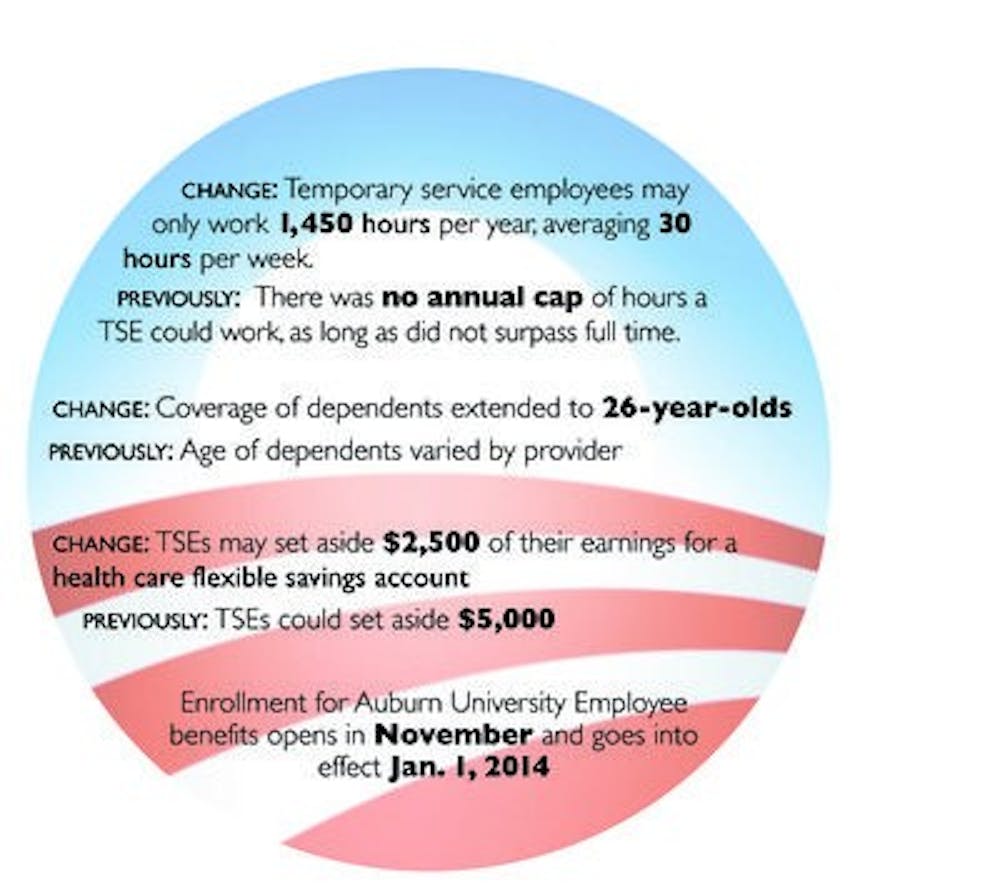President Barack Obama ran on a platform of change, and the Patient Protection and Affordable Care Act, PPACA, is causing plenty of that at Auburn.
The healthcare reform also known as Obamacare, changes the health insurance policy employees are offered and the number of hours temporary employees can work.
PPACA was signed into law March 23, 2010, and was upheld as constitutional by the Supreme Court of the United States June 28, 2012.
The legislation requires employers to offer health insurance to full-time employees and contains a mandate defining a full-time employee as someone who works 30 hours per week.
"The biggest change the Affordable Care Act is the one the president has put on hold: the Employer Mandate," said Gary Ward, manager for employee benefits.
Ward said the mandate would require Auburn to offer insurance to employees who work more than 30 hours per week because they would be considered full-time employees.
Karla McCormick, executive director for payroll and employee benefits, said Auburn considers an employee full time if they work 40 hours or more per week.
"Auburn's definition of full-time status is based on working 40 hours per week," McCormick said. "We want to see employees classified as either truly full-time, benefits eligible employees who are eligible for all benefit plans, or truly part-time."
McCormick said this has resulted in either reclassification or hiring of more than 130 part-time employees as full-time, benefit eligible employees.
Mary Prather, manager for Temporary Employment Services, said the law has caused the creation of a limit on the number of hours a temporary employee can work.
"There is a cap of 1,450 per year," Prather said. "That's less than 30 hours per week on average."
Prather also said some temporary employees must take a month after work.
McCormick said this month off has always been required of temporary employees.
She also said it protects employees drawing state benefits from retirement but working part-time.
McCormick said this is to avoid the risk of these employees losing their current insurance.
"If they work enough hours to qualify for Auburn's active employee health insurance coverage, they become
ineligible for their PEEHIP (Public Education Employees Health Insurance Plan) retiree health insurance and must drop it," McCormick said.
PPACA also impacts student employees.
Alessio Summerfield, senior in radio, television and film, said he has experienced the effects of the hours limit first hand.
"I originally had two jobs," Summerfield said. "I have one job, because of the hours cap."
Summerfield said he was a technician at the media and digital resource lab and a videographer for the College of Liberal Arts.
He said when the hours limit went into effect during the summer he no longer had enough hours to split between the two jobs.
"Before, I was working around 30 to 35 hours a week," Summerfield said. "I'm making far less money now than I was."
Summerfield said this change in income has caused him to seek supplemental sources of income.
"Essentially, what I've been doing is free-lance video," Summerfield said. "I would like an opportunity to not look for outside sources of income to keep my power on."
PPACA has also changed the health insurance it offers to full-time insurance.
Ward said the changes are slowly coming into effect.
"There are certain requirements we had to implement into our plan," Ward said.
McCormick said changes include extending coverage to the age of 26 for children of those covered.
PPACA limits the contribution allowance for the health care flexible savings accounts, a portion of earnings set aside by an employee to pay for health expenses.
McCormick said the FSA limit will change to $2500 from $5000.
She said there is also the addition of new fees the University will have to pay as Auburn administers the plan.
Full-time employees are offered two insurance options; to opt for the health insurance plan offered by the University or to look for insurance through the national pool.
"The insurance plan is heavily subsidized by the University," Ward said. "By not using that plan you're losing that subsidy."
Ward said employees pay for the insurance through deductions from their paychecks based on income tiers.
Enrollment for Auburn University employee benefits is open in November and goes into effect Jan. 1.
McCormick said while Auburn has made changes to accommodate PPCA, she anticipates more changes in the near future.
"I anticipate within the next two to three years, we will have to take a look at our health insurance plan design or our premium structure to determine how to continue to offer a high quality health plan at a price we employees and the University can afford," McCormick said.
Do you like this story? The Plainsman doesn't accept money from tuition or student fees, and we don't charge a subscription fee. But you can donate to support The Plainsman.





